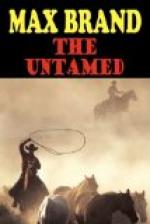Cowboys frequently practise with their revolvers at snakes, but one of the peculiarities of this rider was that he carried no gun, neither six-shooter nor rifle. He drew out a short knife which might be used to skin a beef or carve meat, though certainly no human being had ever used such a weapon against a five-foot rattler. He stooped and rested both hands on his thighs. His feet were not two paces from the poised head of the snake. As if marvelling at this temerity, the big rattler tucked back his head and sounded the alarm again. In response the cowboy flashed his knife in the sun. Instantly the snake struck but the deadly fangs fell a few inches short of the riding boots. At the same second the man moved. No eye could follow the leap of his hand as it darted down and fastened around the snake just behind the head. The long brown body writhed about his wrist, with rattles clashing. He severed the head deftly and tossed the twisting mass back on the rocks.
Then, as if he had performed the most ordinary act, he rubbed his gloves in the sand, cleansed his knife in a similar manner, and stepped back to his horse. Contrary to the rules of horse-nature, the stallion had not flinched at sight of the snake, but actually advanced a high-headed pace or two with his short ears laid flat on his neck, and a sudden red fury in his eyes. He seemed to watch for an opportunity to help his master. As the man approached after killing the snake the stallion let his ears go forward again and touched his nose against his master’s shoulder. When the latter swung into the saddle, the wolf-dog came to his side, reared, and resting his forefeet on the stirrup stared up into the rider’s face. The man nodded to him, whereat, as if he understood a spoken word, the dog dropped back and trotted ahead. The rider touched the reins and galloped down the easy slope. The little episode had given the effect of a three-cornered conversation. Yet the man had been as silent as the animals.
In a moment he was lost among the hills, but still his whistling came back, fainter and fainter, until it was merely a thrilling whisper that dwelt in the air but came from no certain direction.
His course lay towards a road which looped whitely across the hills. The road twisted over a low ridge where a house stood among a grove of cottonwoods dense enough and tall enough to break the main force of any wind. On the same road, a thousand yards closer to the rider of the black stallion, was Morgan’s place.
CHAPTER II
THE PANTHER
In the ranch house old Joseph Cumberland frowned on the floor as he heard his daughter say: “It isn’t right, Dad. I never noticed it before I went away to school, but since I’ve come back I begin to feel that it’s shameful to treat Dan in this way.”
Her eyes brightened and she shook her golden head for emphasis. Her father watched her with a faintly quizzical smile and made no reply. The dignity of ownership of many thousand cattle kept the old rancher’s shoulders square, and there was an antique gentility about his thin face with its white goatee. He was more like a quaint figure of the seventeenth century than a successful cattleman of the twentieth.




